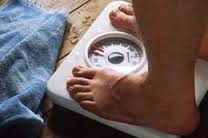March 2nd, 2016
Think Outside the Scale
Scott Cuyjet, RN, MSN, FNP-C
Consider the following case:
An 18-year-old female patient with a body-mass index (BMI) of 43 and no other health issues is referred for gastric sleeve surgery. She has tried multiple diets in conjunction with being moderately active and at best has paused or slowed her weight gain. Her parents and one sibling are not overweight, but her other sibling is. She is told she needs to lose 10% of her body weight over the next four months in order to qualify for the surgery, which seems to be a realistic goal based on this article from the Mayo Clinic. The patient weighs 260 pounds, so that makes 26 divided by four, which is 6.5 pounds a month or 1.625 pounds a week. The problem is that she has already tried multiple diets, is moderately active, and has still been gaining 10 to 30 pounds a year. When she returns for her pre-surgery appointment, she is chastised by the surgeon for not losing all of the weight. The surgeon states that it must be because she did not cut back on her already low 1100-calorie diet. The patient wants to say, “That is why I am resorting to this extreme as my last hope, you idiot,” but instead, tears just flow down her face. The surgeon says he will do the procedure anyway.
 The problem my patient and I had with this case is that many healthcare providers are stuck in an antiquated metabolic model for weight gain, and patients are experiencing discrimination and harassment because of it. According to this model, any calories taken in that are not burned off by one’s basal metabolism or exercise are stored in one’s fat cells and weight is gained. Conversely, if you take in fewer calories than are used, your fat cells should get smaller and you should lose weight. This model does not explain how most of this patient’s adolescent friends can consume 3,000-4,000+ calories a day of junk food, often do very little activity, and still do not gain any weight. A critique of this model can be found in this article in Digg entitled, “The Calorie Is Broken.” As a provider dealing with overweight patients, I have been frustrated with the lack of data about why people gain weight if it is not because they eat too much and don’t exercise. I feel as though I have nothing to offer these patients to help them other than medications that are minimally effective with intolerable side effects, or surgery, which is extreme and has not been an option long enough to know about its potential long-term side effects. Ultimately though, people should not have to lose weight if it is not affecting their physical or mental health. I have patients who are overweight and have no negative health problems who are perfectly content with their weight.
The problem my patient and I had with this case is that many healthcare providers are stuck in an antiquated metabolic model for weight gain, and patients are experiencing discrimination and harassment because of it. According to this model, any calories taken in that are not burned off by one’s basal metabolism or exercise are stored in one’s fat cells and weight is gained. Conversely, if you take in fewer calories than are used, your fat cells should get smaller and you should lose weight. This model does not explain how most of this patient’s adolescent friends can consume 3,000-4,000+ calories a day of junk food, often do very little activity, and still do not gain any weight. A critique of this model can be found in this article in Digg entitled, “The Calorie Is Broken.” As a provider dealing with overweight patients, I have been frustrated with the lack of data about why people gain weight if it is not because they eat too much and don’t exercise. I feel as though I have nothing to offer these patients to help them other than medications that are minimally effective with intolerable side effects, or surgery, which is extreme and has not been an option long enough to know about its potential long-term side effects. Ultimately though, people should not have to lose weight if it is not affecting their physical or mental health. I have patients who are overweight and have no negative health problems who are perfectly content with their weight.
People who are obese have gained a majority of their stigma from data that suggest that the simple fact that someone is overweight or obese makes them unhealthy. The authors of the Digg article state, “[The] inability to curb the extraordinary prevalence of obesity costs the United States more than $147 billion in healthcare, as well as $4.3 billion in job absenteeism and yet more in lost productivity.” Lately there have been some emerging research studies that are questioning the theory that being overweight alone makes one unhealthy. In a recent UCLA study, researchers concluded that, “Close to half of Americans who are considered overweight by virtue of their BMIs (47.4 percent, or 34.4 million people) are healthy, as are 19.8 million who are considered obese.’” They also found that “More than 30 percent of those with BMIs in the normal range — about 20.7 million people — are actually unhealthy based on their other health data.” The health markers used in this study included blood pressure, glucose, cholesterol, and triglyceride levels.
As medical practitioners, we need to educate ourselves to think outside the box, or in this case, outside the scale, in regard to the causes of obesity versus the causes of hypertension, diabetes, hypercholesterolemia, and other markers of poor health. Other current obesity research points to gene-environment interactions as drivers of obesity — as in this article in the New England Journal of Medicine, which states: “There is good evidence indicating that although obesity may start as a lifestyle-driven problem, it can rapidly lead to disturbed energy-balance regulation as a result of impaired hypothalamic signaling, which leads to a higher body-weight set point. Thus, obesity may be considered a disease initiated by a complex interaction of genetics and the environment.” Some possible environmental culprits of this disruption include chemicals. A recent article in the New York Times Magazine about a chemical called PFOA highlights the dangers of such endocrine-disrupting chemicals that can “interfere with human reproduction and metabolism and cause cancer, thyroid problems and nervous-system disorders.”’ According to the same article, “There are 60,000 unregulated chemicals out there right now.”
Another theory among providers is that their overweight patients are just not moving enough. Yet according to this study in the journal Cell Biology (conducted in non-overweight/obese people), people with moderate activity levels only burned an average of 200 calories more a day than sedentary people did and that increasing exercise did not increase calories burned.
Yet another possible cause of obesity may be our gut bacteria. There are emerging theories and data about their possible effect on many health conditions including weight gain. As stated in an article in Scientific American, “New evidence indicates that gut bacteria alter the way we store fat, how we balance levels of glucose in the blood, and how we respond to hormones that make us feel hungry or full. The wrong mix of microbes, it seems, can help set the stage for obesity and diabetes from the moment of birth.” This article from the journal Open Forum Infectious Disease shows potential evidence for weight gain from a change in gut bacteria, although it is only a case study. It is a study of a 32-year-old woman who gained 34 pounds over 16 months after receiving a fecal transplant for C. difficile from her 16-year-old daughter, after which, “She had been unable to lose [the] weight despite a medically supervised liquid protein diet and exercise program.”
Finally, the biggest problem with not knowing more than we do is that the current explanations blame the patient. This can lead to discrimination and shame, which can negatively affect other aspects of patients’ lives. With regard to discrimination based on weight, this article in Psychology Today underscores that it comes from all directions, including healthcare providers. Its findings included:
- More than half of doctors described their overweight patients as ugly, awkward and non-compliant with treatment.
- Nearly one-quarter of nurses admitted to feeling repulsed by their obese patients.
- Nearly 30 percent of teachers said that becoming obese was “the worst thing that can happen to someone.”
- Defendants in lawsuits who are overweight are more likely to get slapped with a guilty verdict.
- More than 70 percent of obese people reported being ridiculed about their weight by a family member.
- Fifty-two percent of obese individuals believe they’ve been discriminated against when seeking employment or a promotion.
- Children as young as 4 are reluctant to make friends with an overweight child.
Other reports indicate that obese children are more likely to be bullied (although this article from CNN is from 2010, the information is still relevant), and obese adults (especially women) make less money than their average-weight peers.
With regard to my patient, it has been a little over a year and she has lost 50 pounds even though her diet and activity are similar to what they were before surgery. She now finds it easier and less stressful to buy clothes, has more friends, and feels more confident. So again, it cannot just be about calories. The removal of part of her stomach changed something about the way she is digesting food and storing or burning calories.
In closing, remember that just because someone is overweight does not mean they are unhealthy. We need to test all patients regardless of weight for things that are actually affecting their health. And remember to be kind and think “outside the scale,” as these are people with feelings who are being bombarded from many directions with messages both overt and subtle about their weight and body image.



I would hardly say the metabolic theory is antiquated, just not completely understood.
To simplify it for patients, I often give them the formula [Calories In] minus [Calories Out] where “calories out” has three basic parts including exercise, basal metabolism and what I like to call the “X Factor” which may be higher or lower in an individual based on many poorly understood mechanisms (e.g. Genetic predisposition, gut flora, other hormonal activity).
We discuss that currently many of these factors are not within our control. I empathize with them that it doesn’t seem fair that one person can eat more calories and maintain a healthy body weight while they can eat half of that and still gain weight.
However, whether it seems fair or not does not take away from the fact that obesity has been linked to increased cardiovascular mortality, increased malignancy risk, higher rates of orthopedic injuries, etc. I’m not going to forgo counseling on obesity to spare feelings when it could save and improve quality of lives. Tact and empathy obviously goes a long way.
Ultimate solution? Eat less calories, exercise more, live longer.
Thomas,
Thank you for taking the time to read the blog and for leaving a reply.
In regards to your statement that, “the fact that obesity has been linked to increased cardiovascular mortality, increased malignancy risk, higher rates of orthopedic injuries, etc.” I think that it is not a fact because it does not affect everyone who is “obese”. I did not cover malignancy or orthopedics, so I would have to do some more research before discussing those, but, according to the recent UCLA study, which I included the link in my post, researchers concluded that, “Close to half of Americans who are considered overweight by virtue of their BMIs (47.4 percent, or 34.4 million people) are healthy, as are 19.8 million who are considered obese.’” They also found that “More than 30 percent of those with BMIs in the normal range — about 20.7 million people — are actually unhealthy based on their other health data.” Half of people considered overweight based on their BMI’s are healthy as are many of the obese people. Conversely, more than 30% of those with BMIs in the normal range are unhealthy in regards to BP, glucose, cholesterol or triglyceride levels. Also, if you look at this link https://www.ucalgary.ca/familymedicine/preventive-care/obesity that Jason posted in his comment and view the graph about mortality, it is worse to have a BMI of <18.5-23.5 for men and <18.5-21 for women than to be in the 35-40 range. The lowest mortality is in the 23.5-35 for men and 21-35 for women.
I would argue that Thomas Drahos did indeed read the study, and the numbers in it do indeed show a higher risk of unhealthy BP/glucose/cholesterol/trigs with increasing weight.
More than 30% of people w/normal BMI are unhealthy
More than 50% of people w/overweight BMI are unhealthy (47.4% are healthy)
About 85% of people w/very obese BMI are unhealthy (15% are healthy)
(They gave the absolute number of people hitting the “obese” number but didn’t give a percentage.)
All the study suggests is that BMI alone doesn’t tell the whole picture, which isn’t really a surprise to anyone who’s been paying attention (particularly when a lot of really athletic people with lean muscle mass hit the “overweight” category–think LeBron James at 27.5). It doesn’t completely clear BMI as an independent risk factor, however–notice the U shape of this BMI vs mortality graph:
https://www.ucalgary.ca/familymedicine/preventive-care/obesity
The mortality doesn’t really inflect upwards on the right end until BMI gets >35, which is admittedly a problem for the governmental busybodies who randomly assigned “over 30” as “obese.”
However, noting that some people with “normal” BMIs have bad numbers in glucose/BP/chol/trigs isn’t anywhere near what the study author called “the final nail in the coffin for BMI.” That’s over-stating the results of the study.
Jason,
Thank you for reading and responding to the post.
My point is not that there is not an increase in morbidity and mortality with increased weight, but that the opinion of the public and many medical professionals is to generalize that “healthy weight” people are healthy and “unhealthy weight” people are not. This information is then used to stigmatize people who are “overweight”.
Another point is that it is not just about one’s metabolism, overeating and lack of exercise so we need to do more research, and in the meantime stop discriminating against people who are “overweight”.
Thank you for the link. That graph is very interesting. In regards to mortality it is worse to have a BMI of <18.5-23.5 for men and <18.5-21 for women than to be in the 35-40 range. The lowest mortality is in the 23.5-35 for men and 21-35 for women.
Yes, some people can diet and not loss weight. That has been shown.
However MOST people do lose weight. This is proven with randomized control trials. In the obesity guidelines low calorie diet is recommended with strong evidence. Here is merely one RCT that demonstrates my point. MOST people lose weight with diets.
http://www.ncbi.nlm.nih.gov/m/pubmed/24513578/?i=5&from=1200%20calorie%20loss
Your article should note that this case study is the exception, not the rule.
Martin,
Thank you for reading and responding to the post.
A case study by definition is just a case study. You may think it is the exception, but I have seen many patients who struggle with this. A case study can also stimulate further research. Again, if the metabolic model works, women and men, depending on age should be able to eat 1800 and 2100 calories respectively and not gain or lose weight. This just does not seem to be true for many people. I also see “normal” to “underweight” patients who want to gain weight and either cannot, or as soon as they stop trying they revert back to their previous weight.
Most people who can lose weight with a severely restrictive diet (800-1200 cal per day) as you mentioned in your link, don’t keep it off unless they keep doing it for the rest of their life. We have not fixed the problem. “If you think about it, people do drop below their set range and stay there. A small percentage of dieters — something like 5 percent — can do it. And they do do it. But they do it by devoting every minute of their life to staying at that weight. Basically, they spend their entire life living like a starving person, fighting biology, and evolution.” – Traci Mann, who teaches psychology at the University of Minnesota and has been studying eating habits, self-control and dieting for more than 20 years. https://www.washingtonpost.com/news/wonk/wp/2015/05/04/why-diets-dont-actually-work-according-to-a-researcher-who-has-studied-them-for-decades/ But why should they have to “starve” themselves if the metabolic model works?
Lastly, I would refer you back to another case study that I mentioned in my post, ‘It is a study of a 32-year-old woman who gained 34 pounds over 16 months after receiving a fecal transplant for C. difficile from her 16-year-old daughter, after which, “She had been unable to lose [the] weight despite a medically supervised liquid protein diet and exercise program.”’
What a great article! It seems you’re very focused on your writing, which is a refreshing change of pace. I see a lot of authors just putting up quick junk, which is unfortunate. Thank you for bringing this information out, it’s much appreciated!
Nelida,
Thank you for taking the time to read it and write such a positive response.
Scott,
Great article, well-written. Thanks for posting!
Dan
Dan,
Thanks for reading it and leaving a reply.
Scott